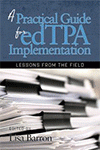
A Practical Guide for edTPA Implementation
Lessons From the Field
Edited by:
Lisa Barron, Austin Peay State University
Published 2019
edTPA is the most widely-used performance assessment for pre-service teachers in the United States, and a requirement in many states for teaching licensure. Through edTPA, teacher candidates demonstrate their effectiveness in different aspects of teaching, including planning, instruction, assessment, analysis of teaching, and use of academic language.
This book is a practical guide for anyone involved in edTPA implementation. The chapters are written by experienced teacher educators who are leading successful edTPA programs in their own universities, who are in the field, and involved in the work. They represent diverse teacher preparation programs, each with their own strengths and challenges. This book addresses the challenges of edTPA, while providing practical strategies for educative and thoughtful implementation. Organized into four sections, each section explores a different aspect of edTPA implementation, and provides guidance for leading faculty and teacher candidates through edTPA.
CONTENTS
Introduction, More Than a Score, Lisa Barron. Acknowledgements. SECTION I: FRAMEWORK FOR IMPLEMENTATION. A Consequential Validity Framework for Performance Assessment Implementation Based on a Statewide Adoption of edTPA, Su Jung Kim and Mistilina Sato. Compliance, Affirmation, Alignment or Learning? Influencing the edTPA Process Through One’s Stance, Maxine Alloway and Joan Lesh. Curriculum Mapping: Providing Structure and Space for edTPA, Benita Bruster and Lisa Barron. SECTION II: IMPLEMENTATION MODELS. Sharing our Stories: Different Paths to edTPA Implementation Within the MD edTPA Collaborative, Angela L. Snyder, Althea Pennerman, Margaret Spicer, Amber Meyer, and Lisa Pallett. edTPA Essentials for Candidate Support and Success, Julie C. Baker, Amy Brown, Cherie Hook, and Allen Mathende. 1,800 Teacher Candidates Later: Lessons Learned With Large Program Implementation, Kristen Cuthrell, Elizabeth Fogarty, Diana Lys, Joy Stapleton, and Christina Tschida. Teacher Candidate edTPA Support: A Five-Pronged Approach, Doreen Keller, Lisa Laurier, and Keith Lambert. Your Road Map to the edTPA, Becky Hall and Catherine O’Callaghan. edTPA Steps to Success: Elementary Education Literacy Tasks 1-3, Rachael Schuetz. SECTION III: SPECIALIZED SUPPORTS. Unpacking Elementary Mathematics edTPA: Making the Most Out of Methods Courses, Jennifer Renee Meadows and Leslie Ann Suters. Practical Strategies for Implementing the edTPA in K-12 Content Areas, Kathryn Davis. Supporting Teacher Candidates’ Commentary Writing, Joseph Johnson, Kelly Jewell-Glasscock, and Amy Rader. The Use of Video to Examine Teaching, Melanie Hundley, Heather Johnson, and Amy Palmeri. The edTPA-PBL Union: A Program Journey, Ashlee Hover, John Lando Carter, Josh Tipton, Terry Goodin, and Heather Dillard. Using Nonfiction Literature Circles to Process the edTPA Handbooks and Supporting Documents, Kristen Pennycuff Trent, Alicia Laffoon, Malinda Hoskins Lloyd, Queen Ogbomo, Stephanie Richards, and Amy Leigh Rogers. Using Response to Intervention as a Model for Candidate Support for edTPA, Sarah Cannon, Erin Thomas Horne, and Cyndi Edgington. Framing Academic Language for Perservice Teachers, Melanie Hundley and Robin Jocius. SECTION IV: BEYOND edTPA. Going Beyond Rubric Scores: Meaningful Use of edTPA Data, Lori Kroeger. edTPA Retake Process: Not a Call for Crisis Management, Elisa Palmer and Lori Kroeger. The Journey From Teacher Preparation to Induction, Pam Wetherington, Savannah Overby, and Caprisha Battle. Use of edTPA Rubric Constructs in Teacher Induction, Bryan S. Zugelder, Mark L’Esperance, Patrick J. Conetta, and Tiffany Watts. About the Editor. About the Contributors.
-
Paperback978-1-64113-815-4
Web price: $62.04 (Reg. 72.99)
-
Hardcover978-1-64113-816-1
Web price: $89.24 (Reg. 104.99)
- eBook978-1-64113-817-8

- EDU011000 - EDUCATION: Evaluation & Assessment
- EDU029000 - EDUCATION: TEACHING METHODS & MATERIALS: General
- EDU053000 - EDUCATION: Training & Certification
-
 A Practical Guide to Exemplary Professional Development Schools
A Practical Guide to Exemplary Professional Development Schools
-
 Beyond Single Stories
Changing Narratives for a Changing World
Beyond Single Stories
Changing Narratives for a Changing World
-
 Contemporary Perspectives on English as a Medium of Instruction
Contemporary Perspectives on English as a Medium of Instruction
-
 Cultivating Democratic Literacy Through the Arts
Guiding Preservice Teachers Towards Innovative Learning Spaces in ELA Classrooms
Cultivating Democratic Literacy Through the Arts
Guiding Preservice Teachers Towards Innovative Learning Spaces in ELA Classrooms
-
 Supporting Leaders for School Improvement Through Self-Care and Wellbeing
Supporting Leaders for School Improvement Through Self-Care and Wellbeing
-
 The AMTE Handbook of Mathematics Teacher Education
Reflection on Past, Present and Future – Paving the Way for the Future of Mathematics Teacher Education, Volume 5
The AMTE Handbook of Mathematics Teacher Education
Reflection on Past, Present and Future – Paving the Way for the Future of Mathematics Teacher Education, Volume 5
-
 The Handbook for Aspiring Higher Education Leaders
The Handbook for Aspiring Higher Education Leaders

